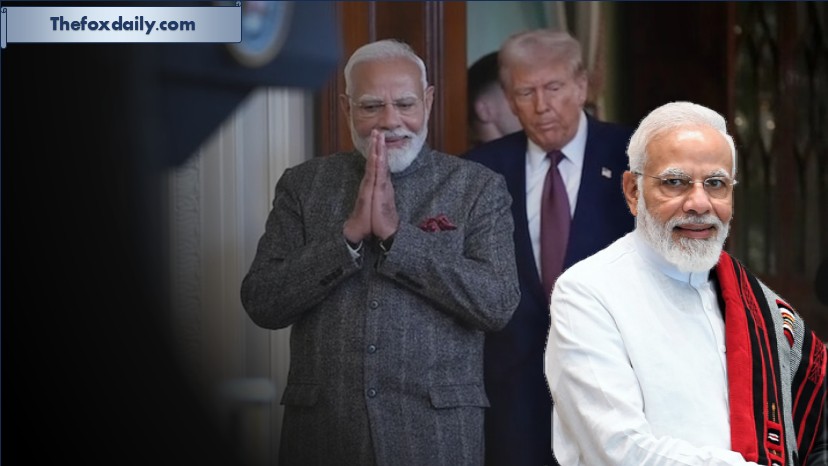
The high-profile Gaza Peace Summit in Sharm el-Sheikh, co-chaired by U.S. President Donald Trump and Egyptian President Abdel Fattah El-Sisi, brought together more than 20 international leaders to discuss a roadmap for peace and reconstruction in Gaza. However, Prime Minister Narendra Modi chose not to attend the crucial meeting, prompting questions about the reasoning behind his decision.
India was instead represented by Kirti Vardhan Singh, Minister of State for External Affairs, who joined the summit’s discussions on ceasefire mechanisms, rebuilding efforts, and future diplomatic coordination. Modi’s absence, despite a personal invitation from El-Sisi, has sparked speculation about the diplomatic considerations influencing India’s move.
Why Did PM Modi Skip the Gaza Peace Summit?
According to diplomatic observers, the Prime Minister’s decision not to attend may have stemmed from multiple geopolitical factors. The most prominent among them is the possible avoidance of sharing a stage with Pakistan’s Prime Minister Shehbaz Sharif, whose presence at the summit raised political and strategic sensitivities for New Delhi.
Tensions between India and Pakistan remain high following the Pahalgam terror attack on April 22, which killed 26 people, mostly tourists. The attack, reportedly carried out by Pakistan-backed militants, triggered India’s retaliatory Operation Sindoor and a wave of diplomatic and economic actions against Islamabad.
As part of its counter-response, India suspended the Indus Waters Treaty and closed the Attari–Wagah border checkpost. These moves marked one of the sharpest escalations between the two nations in recent years.
During the Shanghai Cooperation Organization (SCO) Summit in China earlier this year, PM Modi had already criticized “certain countries” for openly supporting terrorism — a remark widely interpreted as a reference to Pakistan. His comments reflected India’s hardened stance post-Pahalgam attack, stating that nations endorsing terrorism cannot expect normal diplomatic relations.
India’s Stance on Terrorism and Diplomatic Symbolism
“India has borne the brunt of terrorism for four decades,” PM Modi declared at the time, emphasizing that global cooperation is essential to combat terror in all its forms. The message signaled India’s unwillingness to engage in symbolic diplomacy until Pakistan demonstrates accountability for cross-border terrorism.
Social media also circulated clips showing PM Modi and Russian President Vladimir Putin deliberately bypassing Sharif during a group photo at a prior international event — a moment many interpreted as a subtle diplomatic snub.
In July, PM Sharif extended an olive branch seeking “meaningful talks” with India, but the proposal received no response from New Delhi, underlining India’s current zero-tolerance approach to dialogue without action against terrorism.
The Trump Factor and U.S.–India Dynamics
Another possible factor in PM Modi’s absence could be related to U.S. President Donald Trump’s involvement in the summit. Trump, who is co-chairing the event, has previously claimed to have mediated peace between India and Pakistan following Operation Sindoor — a claim that India has consistently refuted.
Indian diplomats may have wanted to avoid a repeat of recent situations where President Trump attempted to use symbolic gestures, such as joint photo opportunities, to promote his role as a global peace broker. This strategy, seen earlier during the Armenia–Azerbaijan truce, appeared designed to enhance his Nobel Peace Prize ambitions.
It’s also important to note that India–U.S. relations have experienced turbulence in recent months. The imposition of a 50% tariff on Indian imports by President Trump, as a consequence of India’s continued purchase of Russian oil, had caused friction between the two nations. Although the situation has since improved, sensitivities remain.
According to diplomatic sources, PM Modi initially declined to answer calls from President Trump following the tariff announcement but later spoke with him on his 75th birthday. The two leaders have met several times since then, with Modi commending Trump’s 20-point Gaza Peace Agreement aimed at stabilizing the Middle East.
Recent Engagements and the Political Optics
On October 9, Modi again reached out to President Trump, congratulating him on the peace initiative and reviewing progress in bilateral trade negotiations. However, analysts suggest that despite improved tone, New Delhi remains cautious of being drawn into U.S.-driven geopolitical narratives that could complicate India’s regional diplomacy.
President Trump has continued to assert that his sanctions and diplomatic efforts helped prevent further escalation between India and Pakistan — a claim India firmly denies. New Delhi maintains that any ceasefire or de-escalation resulted from direct communication between the military leadership of both countries, not foreign mediation.
Modi’s Calculated Diplomatic Move
President Trump had earlier invited PM Modi to visit Washington during the G7 Summit in Canada to discuss the India–Pakistan situation. However, Modi declined the invitation amid reports that the Pakistani Army Chief was also scheduled to visit Washington at the same time. Sources indicate that India did not want to provide Trump with another opportunity to claim diplomatic credit for easing tensions between the two nuclear-armed neighbors.
Given these complex geopolitical dynamics — from strained India–Pakistan relations to cautious engagement with the U.S. — Modi’s decision to skip the Sharm el-Sheikh summit appears to be a strategic diplomatic calculation rather than an oversight.
By deputing Kirti Vardhan Singh to represent India, the government ensured its presence at the global platform without compromising on diplomatic positioning or signaling premature reconciliation with Pakistan.
India’s Broader Message
India’s choice sends a clear message: while it remains committed to supporting global peace initiatives, it will not compromise its stance against terrorism or allow political optics to undermine its national interests. As India continues to play a balancing role in regional stability, PM Modi’s absence serves as both a statement of principle and a reflection of evolving diplomatic strategy.
Bottom line: PM Modi’s decision to skip the Sharm el-Sheikh Gaza Peace Summit highlights India’s careful navigation of global alliances. By maintaining strategic distance from adversaries while still participating diplomatically, New Delhi is reinforcing its position as an independent global player prioritizing national security and regional stability.
For breaking news and live news updates, like us on Facebook or follow us on Twitter and Instagram. Read more on Latest India on thefoxdaily.com.






COMMENTS 0